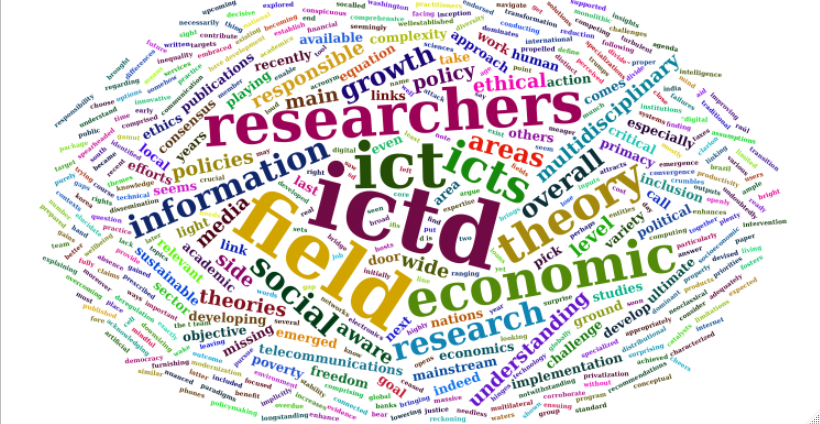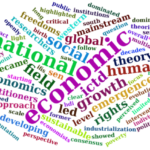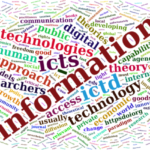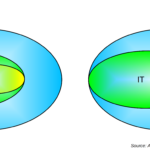As a multi-disciplinary field, ICTD research hosts a wide variety of knowledge and expertise initially developed in other academic areas, ranging from specialized information theory to broad economic development. That should not be a surprise as ICTs emerged from the convergence of telecommunications, electronics and computing, and information dissemination.
Looking at the left side of the ICTD acronym, we thus find three distinct areas. Information opens the door to information theory and information systems, among several others. Next in line is Communication that brings in media and thus media theory and has been propelled by the emergence and seemingly primacy of social media and social networks. Last but not least is digital Technology, the more technical area of the overall field. Note that telecommunications can be seen as a bridge between IC and T but, for the most part, is perceived as a member of the T team. In this light, the field attracts academics and researchers from a wide variety of well-established fields.
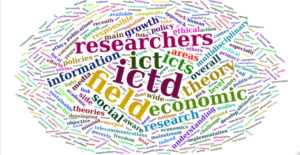 On the right side of the equation, we have Development, another multi-disciplinary field comprising mostly the social sciences and economics. Development studies are perhaps one of the best know areas and one that has been under attack for the last 20 years or so, particularly from the side of mainstream economics. Some even argue that development studies have ceased to be relevant at all.
On the right side of the equation, we have Development, another multi-disciplinary field comprising mostly the social sciences and economics. Development studies are perhaps one of the best know areas and one that has been under attack for the last 20 years or so, particularly from the side of mainstream economics. Some even argue that development studies have ceased to be relevant at all.
Being that as it may, the dominant field here is mainstream economic development, which is put into real practice by the core International Financial Institutions (IFIs). These entities provide massive loans to developing nations to pursue policies prescribed by them in the name of development and global stability. Sustainable Development has recently gained important ground, but growth still trumps the environment globally. The crucial point here is that development is highly political. And a level playing field among the many development theories does not exist. At the policy level, one approach dominates, thus leaving all others meager crumbles to munch.
ICT + D is thus full of complexity. We are bringing together two multi-disciplinary areas, each comprised of comprehensive sets of themes and specializations that should be appropriately identified when conducting ICTD research. One outcome of such diversity is the lack of consensus on many topics.
Notwithstanding such complexity, the main challenge ICTD has been facing almost since its inception is the link between ICT and D. In other words, how exactly do ICTs enable or enhances development. That seems to be the missing link. Inputs and outputs do not seem to be properly connected. ICTD researchers are aware of this gap. Recent research and publications have focused on finding innovative ways to establish such links in both theory and practice. The answer to this critical question hinges on how researchers define development.
Over the years, ICTD researchers have embraced a wide gamut of development theories, including neoclassical economic growth, modernization theory, distributional justice, socio-economic transformation, freedom and human rights, social inclusion, productivity increases, overall well-being and human development. Take your pick. Somehow missing in action are the Washington Consensus (WC) and, more recently, Sustainable Development (SD).
WC conspicuous absence is indeed surprising as early ICTD researchers and practitioners openly or implicitly endorsed many of its policies, including privatization, deregulation, state downsizing and, of course, lowering taxes on ICT products and services. The so-called “digital divide” was the clarion call, soon becoming the main development objective. Our job was to close such a divide at any cost. Needless to say, no existing development theory included such an objective, so linking it to poverty reduction efforts spearheaded by multilateral development banks became part of the action.
Indeed, plenty of research and academic publications saw the light of day trying to elucidate how ICTs could reduce poverty. However, the evidence available does not corroborate such claims. Moreover, the ICTD field is, for the most part, full of failures when it comes to implementation on the ground. That should be a loud wake call to researchers. A time for reckoning is overdue.
All in all, ICTD researchers should thus be mindful of the following.
- Consider that, in the ICTD equation, ICTs are a means to an end, development. ICT for development is not the same as the development of ICTs. The latter is also a relevant field on its own, as shown by countries such as South Korea, India, and Brazil, which have devised policies to develop an ICT sector. A national ICT sector can undoubtedly contribute to economic growth. But economic growth can take place without proper development, especially in the age of economic inequality.
- Understand that ICTs are at best catalysts to development. They can enhance development efforts by furnishing new options and solutions to traditional and longstanding development priorities and gaps. On the other hand, not all development targets can benefit from ICTs.
- Adequately navigate the turbulent development theory waters by understanding the main paradigms available out there while acknowledging that there is no such thing as a level playing field among the various competing theories.
- Be aware of the primacy of economic development within the development field. Overcoming this can be achieved only by fully understanding its overall assumptions and ensuing limitations.
- Bear in mind that development is a political field, especially regarding policy recommendations and policy and program implementation.
- Develop a better understanding of public policymaking and its links to ICTD research. This is an area that has not been really explored by ICTD researchers. I have written a paper on this, which will be published later this year.
- Be well aware of local contexts. Developing countries are not a group of nations that can be characterized as monolithic. Differences among them are not only ample but decisive. What might work in one does not necessarily work in another, even if it is next door. The more local you get, the more nuanced your approach needs to be.
- Do not lose sight that the ultimate goal of any ICT intervention is Development. It is not the number of Internet users or cell phones that we should target. Improving the overall standard of living not limited to purely economic gains is the ultimate goal, democracy, freedom to choose and social inclusion being part of the package.
- Be ready for the upcoming Artificial Intelligence challenge. AI is not part of the ICT team, so the field must be prepared for yet another conceptual transition. AI4D has now emerged, as expected, but it seems to have similar challenges when it comes to explaining how it fosters development.
- AI has also brought to the fore ethics and responsibility. ICTD researchers should pick on these insights and use ethics as another critical tool for the development agenda. Ethical and responsible development supported by ICT or AI could have a bright future. It is not about ethical and responsible ICT or AI for development. It is ICTD or AI for ethical and responsible development.
Cheers, Raúl
